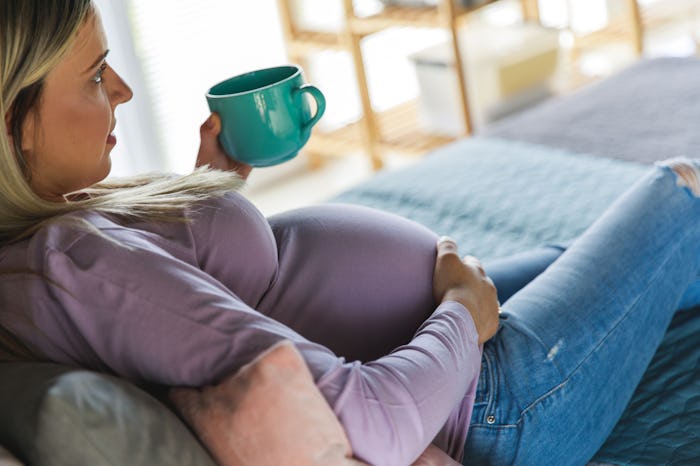Pregnancy

What Happens To Your Body When It Feels Like Your Baby Is Kicking Your Bladder
Ouch.
There is no cooler feeling than that first fluttering in your belly when you’re pregnant. You feel the baby move for the first time, and it’s magical — until it’s more frequent, it happens all night long, you can’t sleep, and your internal organs feel like punching bags for your baby. They gain great pleasure from popping you when you least expect it, especially on your bladder when there’s no restroom in sight. Why do they do that? Are they strong enough to kick through your uterus? What does it mean when your baby is kicking your bladder?
"The baby isn't necessarily kicking your bladder directly, but the inside of the uterus,” Dr. Eva Martin, M.D., CEO of Elm Tree Medical Inc., tells Romper. "The bladder sits right next to the uterus, so if the baby kicks the inside of the uterus next to the bladder, you might feel it at your bladder." Knowing your little one isn’t going to literally drop kick a hole through your organs before birth — though it might feel like they are — is definitely a relief. But what exactly does this normal, albeit pretty uncomfortable, occurrence mean? And is there any way to make it feel any better?
What It Means When The Baby Kicks Your Bladder
Other than possibly making more frequent trips to the bathroom day and night, it’s entirely safe for you and baby when you feel kicking on your bladder. Thank god, since it does feel like they’re possibly going to pierce the tissue sometimes.
And while it’s not the best time for the person carrying the baby, you can actually take it as a good sign. “Bladder pressure and discomfort are not always fun, [but] the baby's movement against your bladder is a normal part of healthy growth and development,” board-certified OB/GYN Dr. Kameelah Phillips, M.D., tells Romper. When your baby kicks your bladder, it really just means they are healthy and moving. “It is important to feel regular movement in the third trimester,” Phillips notes. “Your baby's movements should continue on their normal schedule and are an important sign of health.” Noted: Your increased urge to use the bathroom is simply pointing to a healthy, wiggling baby.
Managing With The Discomfort
Unfortunately, when your baby kicks your bladder it does not feel good. "The baby is cushioned inside the uterus and can't harm your bladder," Martin says. "The baby wouldn't kick so hard as to affect bladder function or cause urine loss; however, the weight of the uterus over the pelvic floor can cause urine loss in later pregnancy, so it's important to do your Kegel exercises every day."
By 35 weeks, you’re likely to experience increased pressure on your pelvis, especially the bladder (if you haven’t already), explains Phillips. “As your uterus grows it will lean on surrounding organs, especially the bladder, which is in front of the uterus,” she tells Romper. “Your bladder is a sensitive organ and will sense pressure and movement from your baby. If your baby is head down, you will feel movements of the head — especially if your bladder is full. If the feet are pointing down, you may feel sudden movements from kicking.”
Still uncomfortable? Unfortunately, according to Martin, there isn't really a way to make your baby stop. "But rest assured that feeling the baby move is a good sign of health," she adds. Even though it’s uncomfortable and frustrating now, as long as you’re feeling that baby moving around in there — even if they are doing some kickboxing training — it’s typically a sign of good health for your baby. And don’t worry, it’s not damaging to your body.
Experts:
Dr. Eva Martin, CEO of Elm Tree Medical Inc.
Dr. Kameelah Phillips, M.D., board-certified OB/GYN and founder of Calla Women’s Health
This article was originally published on